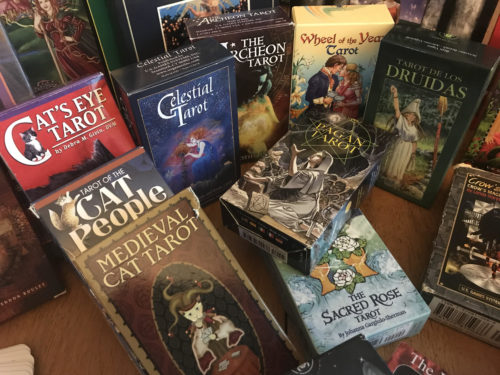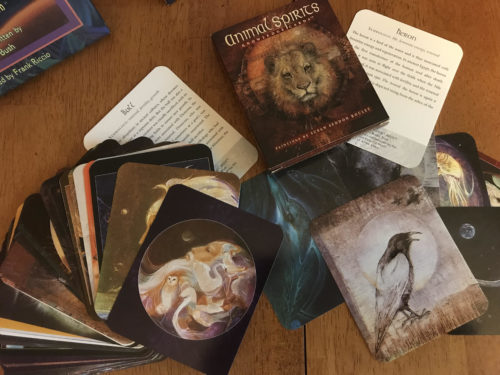TWH — With Samhain getting closer and days getting shorter, many Pagans turn to divination outside of their daily routines. Tarot cards are one of the most popular and most common forms of divination found in magical circles. With the 100s of decks available, trying to find one that fits into one’s practice and spiritual life can be difficult. Star Bustamonte, who is a professional tarot reader in North Carolina and the writer of the Wild Hunt weekly tarot, offers her tips on how to pick the right deck for your work.

[S. Bustamonte].
Star Bustamonte: It is true; trying to pick the right tarot deck can be frustrating and a little mind-boggling once you realize how many decks are available. Just a quick internet search of any major book retailer will easily turn up over 200 different decks. Exactly how many decks have been published since tarot cards first were created in the early to mid 1400s is difficult to pin down. Hundreds and hundreds of decks exist today.
How does one go about getting the right deck? The very first question you need to ask yourself is how you plan to use the deck. Do you want a deck for deep personal work? Daily guidance? Spell work? Or maybe you want to learn how to read the tarot for others. Answering this question will help to narrow down what kinds of decks might work for you.
TWH: What do you mean by “kinds of decks”? Are there more than one?
SB: There are three basic categories of divinatory cards: Standard tarot, Lenormand decks, and oracle cards.
A standard tarot deck has 78 cards, and is divided into the Major arcana and Minor arcana. The Major arcana made up of 22 cards and are often referred to as trumps (some tarot experts cite 21 cards as trumps, plus The Fool card). The Minor arcana has 56 cards and largely resembles a regular playing deck.
Lenormand decks are named after French cartomancer, Marie Anne Adelaide Lenormand (1772-1843). The Lenormand decks are comprised of 36 cards and based on the deck Lenormand used and is rumoured to have created herself. Unlike standard tarot cards, there is no reversed meaning, as each card embodies both positive and negative aspects of its meaning. Lenormand decks are more popular in Europe, especially France, and have only as of late increased in popularity in the US.
Oracle card decks can contain any number of cards and are often distinctly different from the standard tarot. They are frequently themed with animals, trees, angels, crystals, etc., with each card having its own message.
TWH: Are there difference in the ease of use for a beginner? Is one type of deck easier to learn to use than another?
SB: In general, using a standard tarot deck requires a little more commitment to learning and understanding the symbology and meaning of each card, especially if the intended use is in-depth, detailed divinatory practice. Lenormand decks being less in number of cards are a wee bit less onerous in commitment than the tarot, but still offer plenty of opportunity for divining what might be on the horizon. Oracle decks are easier to use and often a preferred choice for daily meditations and guidance. Serious practitioners often possess and use both types for a variety of purposes.
TWH: What is the next step?SB: Once youʼve decided how you plan to use a deck, and whether you want a standard tarot, Lenormand, or an oracle deck, you can begin looking at the various decks available. That brings us to our next hurdle – actually viewing the cards.
TWH: Why is viewing the cards such a hurdle?
SB: Most brick and mortar retailers do not have open decks that you can paw, er, gently sort through. You are likely to have slightly better luck shopping at your local, independent store than big box retailers. At best, they might have a book with sample cards from various decks that they might or might not have in stock. If you have my luck, the deck you fall in love with will be out of stock! The other option is to look at images online, but almost no free site will display all the images of every deck.
Sites like Foolʼs Dog provide divinatory apps for multiple decks. If you enjoy doing everything digitally, this can provide you with an inexpensive way to explore and use a variety of decks.
TWH: Cards seem to come in a variety of sizes. Does that matter?
SB: While imagery and meaning is important, size definitely matters. Iʼm often of a mind that the people who create decks must deliberately choose odd dimensions just to aggravate me. So many of them are weirdly sized whether large, small, or somewhere in between. Even if you buy a deck from store where you can physically handle the box, you may find that once you get the deck home the cards are smaller or larger than the box led you to believe. This is particularly true of boxed sets.
And then there is the thickness and finish of the cards. I recently used a beautiful deck but the cards were so much thicker than I what I am used to that it made shuffling difficult. The flat finish on the cards also felt strange to me and did not exactly aid in the shuffling process.
TWH: You have discussed the importance of being clear on usage, the type of deck, the imagery and physicality of the cards. Are there other tips that beginners need to know as they begin their search wading through the 100s of decks available?
SB: Going back to imagery, there are literally hundreds and hundreds of decks with just about every kind of theme that you can think of, and another 100 you would not have ever dreamed of. Seriously. If you love cats, there are many cat-themed decks to choose from. That is one good way to start narrowing down the options. What do you like? I currently own 5 or 6 cat decks. Hey, donʼt judge me!
Whatever your focus, from myth and magic to flora and fauna, there are probably a number of different decks that will appeal. There are Wiccan-based decks, and Witch-themed oracle cards, for example. Tarot creators have gone far beyond the Pagan- or nature-specific themes as well. For example, there are decks specifically designed for or dedicated to the LGBTQ+ community and there are decks based on pop culture. For example, there are Cthulhu and H.P. Lovecraft themed decks and another based on the art of H.R. Giger.

[S.Bustamonte]
SB: The best option beyond simple trial and error is finding sharing resources. Some occult stores, for example, do semi-regular tarot swaps. At these events, people bring decks that they no longer use or ones that donʼt resonate with them. They trade them out with decks supplied by other people in the same boat. This can be a great way to actually handle and view a deck, as well.
To cut down on expenses, used decks can sometimes be found for sale at various Pagan events, or even flea markets and yard sales. Just make sure all the cards are there before you buy one. I would also strongly urge a good energetic cleansing of any secondhand cards before using them.
You can also look for other community events that revolve around tarot cards. If you are a member of a coven or other spiritual group, you may have good luck in finding fellow card enthusiasts within the group. Classes and workshops taught on the tarot usually involve the instructor having a variety of decks for use during the class and to show off as examples. Other participants might also bring their own decks. These are great ways to view and even feel decks before buying.
TWH: There seems to be a ton of trial and error in the process. But, at the same time, there are very accessible options for research before diving in.
SB: Yes. These days there are more choices and more information readily available on the tarot (and everything else) than ever before. Thanks internet! My best advice is to do that research, to read reviews, and to see what resonates with you personally. What it all boils down to, regardless of style, imagery, or type of deck, is that you have a card system that you like and that feels right for you. And, if you are like me, tarot decks can be a lot like that famous potato chip, stopping at just one is almost impossible.
* * *
You can find Star Bustamonte’s weekly Wild Hunt Tarot reading every Monday in Pagan Community Notes.
The Wild Hunt is not responsible for links to external content.
To join a conversation on this post:
Visit our The Wild Hunt subreddit! Point your favorite browser to https://www.reddit.com/r/The_Wild_Hunt_News/, then click “JOIN”. Make sure to click the bell, too, to be notified of new articles posted to our subreddit.
